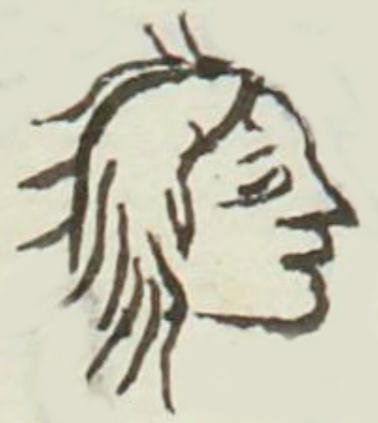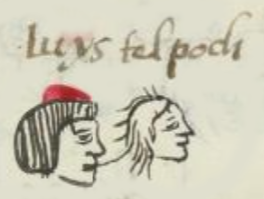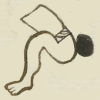Telpoch (MH874r)
This black-line drawing of the simplex glyph for the personal name Telpoch (perhaps “Young Man”) is attested here as a man’s name. The glyph shows the head of a man in profile, facing toward the viewer’s right. The gloss tells us that this is a young man (telpochtli). He has loose, somewhat long hair, perhaps that of a young man. There is nothing to indicate that he is a warrior, although “young warrior” is one translation, as is “son.”
Stephanie Wood
For such a common noun (telpochtli), it is surprising that this is only the third glyph of its kind to enter this database (February 2025), with over 6K records. We do have representations of Huei Pochtlan and Opochtli. About the “poch” element that they all share, In her unpublished essay (shared with me) reviewing the work of Berdan and Anawalt in deciphering place names in the Codex Mendoza, Frances Karttunen adds this in her notes: "There seems to be a morpheme in ichpo:ch- 'young woman' and telpo:ch- 'young man' that may also occur in the deity names o:po:ch- and hui:zilo:po:ch-. It forms its plural by reduplication: po:po:ch-; cf. telpo:po:chtin 'young men' rather than simply tel.po:chtin.”
Stephanie Wood
luys telpoch
Luis Telpoch
Stephanie Wood
1560
Jeff Haskett-Wood

telpoch(tli), son, young man, a youth, a young warrior, https://nahuatl.wired-humanities.org/content/telpochtli
Jóven
Stephanie Wood
Matrícula de Huexotzinco, folio 874r, World Digital Library, https://www.loc.gov/resource/gdcwdl.wdl_15282/?sp=820&st=image.
This manuscript is hosted by the Library of Congress and the World Digital Library; used here with the Creative Commons, “Attribution-NonCommercial-ShareAlike 3.0 License” (CC-BY-NC-SAq 3.0).





